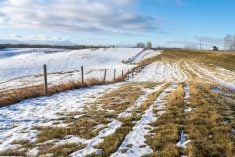Following more rainfall over the weekend, any chance of additional seeding is now over for many producers in southwestern Manitoba, says a provincial rep in the region.
Rainfall amounts in the area weren’t severe, with 10 to 20 millimetres of precipitation June 13-15, but it was enough to finish off fields that were already drenched.
“Given the forecast … I would say the fall is the next seeding date. Things are just that wet,” said Scott Chalmers, Manitoba Agriculture crop diversification specialist in Melita, Man. “It is what it is and that’s what it will be. Maybe five percent around Pierson seeded. Maybe 15 percent (around) Melita and it gets better as you go northeast. Reston might be 30 percent, Virden might be 60 to 70. Souris, same thing. Sixty to 70 percent.”
Read Also

B.C. ostriches now to be culled after ruling: CFIA
Birds are now to be culled from a British Columbia ostrich operation that sought to bypass standard federal practice in on-farm outbreaks of highly pathogenic avian influenza and has been denied an appeal at Canada’s highest court.
After several significant rainfalls in early May, growers in the region were counting on dry weather in late May and early June to salvage the 2014 crop.
But for many producers, the dry weather never arrived.
Rain fell on Pierson, for example, on nine of the first 15 days of June. In Deloraine it rained 10 days between June 1 and June 15.
Chalmers said fields are even too wet for broadcasting canola.
“You can’t get your tractor on the field…. We would need two weeks of pure sunshine and wind to even think of getting on the field.”
Chalmers said soybean acres will drop in the region. Many growers backed away from the crop because it should be seeded in the third or fourth week of May.
Glen Franklin, who farms near Deloraine and is the Keystone Agricultural Producers director for the region, said some growers will persist and try to get on the land.
“There actually was a fellow seeding next door to me, Saturday afternoon,” he said. “Some of them will definitely sow wheat right up to the 20th (of June).”
Chalmers said the situation isn’t as severe as 2011, when spring rains and overland flooding caused 2.9 million acres in Manitoba to go unseeded, primarily in the southwestern portion of the province.
Fewer producers are affected this year, but the area hasn’t fully recovered from previous floods, Chalmers said.
“Economically, I’d say we’re still reeling from 2011.”















